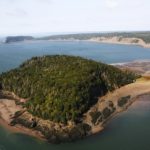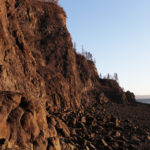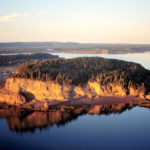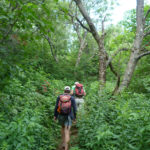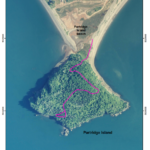Partridge Island, across the Bay of Fundy from Cape Blomidon, has long been a site of richness for people and wildlife. It is a site of many Kluskap legends for the Mi’kmaq. For thousands of years, the Mi’kmaq have gratefully harvested natural resources from the island’s slopes, shores, and forests, and continue to do so today. They refer to the island as Wa’so’q, meaning heaven, because of its abundance of essential resources including semi-precious stones and glass-like rocks.
Another Mi’kmaw name for the island – Plawej Mniku – means Partridge Island, and comes from the fondness for the island by Ruffed Grouse (often referred to as partridge), because of the island’s hardwood tree species’ buds, leaves, and twigs, a preferred food of Ruffed Grouse.
The island is precious for other bird life too. It hosts migratory birds, both on their long annual pilgrimages and during the breeding season. More than 50 species of bird have been observed using the island, including the Peregrine Falcon. The big Yellow Birch trees here create a microhabitat of shade and higher than average humidity, where ferns, lichens, insects and more can also thrive. The island’s original forest was cleared by settlers, although many of the signs of these disturbances have been overgrown with lush vegetation. Now the island’s wild character is coming back, and will be protected, forever.
Much of the island is owned by Acadia University, which has entered into a conservation easement with the Nova Scotia Nature Trust in 2016 (along with fellow island landowners Dalhousie University, Sharon Taylor, and another landowner) to ensure that the island will be conserved and cared for in perpetuity. The lands are managed for nature conservation by the Nature Trust in partnership with local landowners, volunteers, and visitors.
Learn more about the cultural significance of the island through the Mi’kmaway Debert Cultural Centre’s Sa’qewe’l kmitkinal (Ancestors Live Here) project.
Please enjoy these lands in a respectful way by ensuring that you do not disturb, remove, damage, or destroy any plants, wildlife and other natural features of the property. Visitors to the island are asked to help keep the island wild by staying on the trail (managed by the Municipality of Cumberland). Protect the Peregrine Falcons, which are particularly vulnerable to human disturbance, by not flying drones on or around the island.
Let’s work together to enjoy the island’s special features in a sustainable way, to support its preservation for the generations to come.

